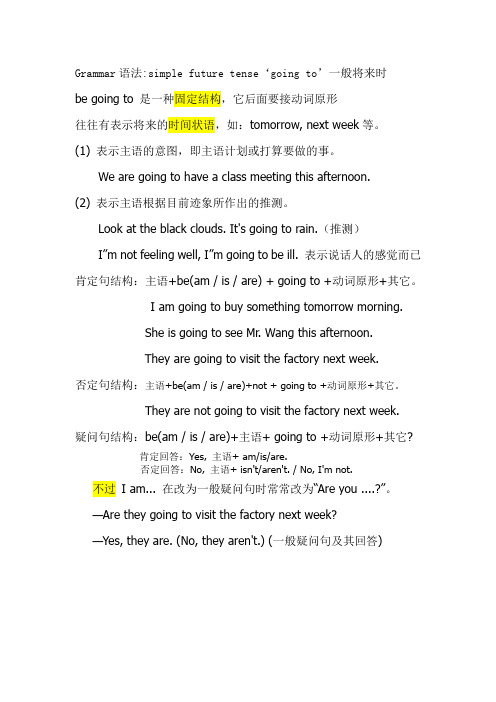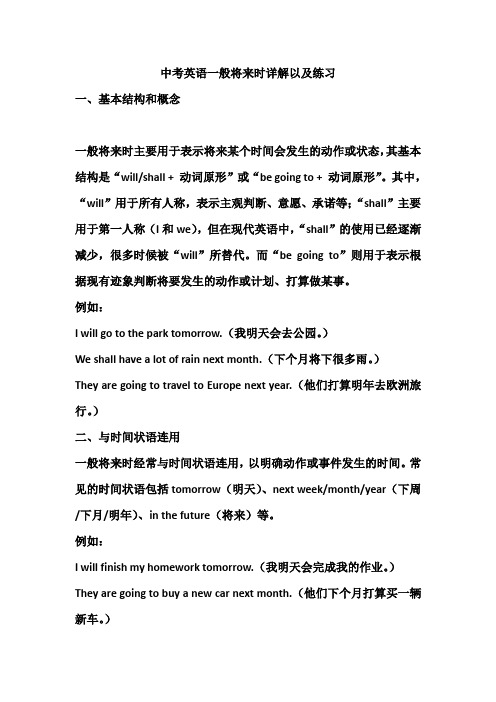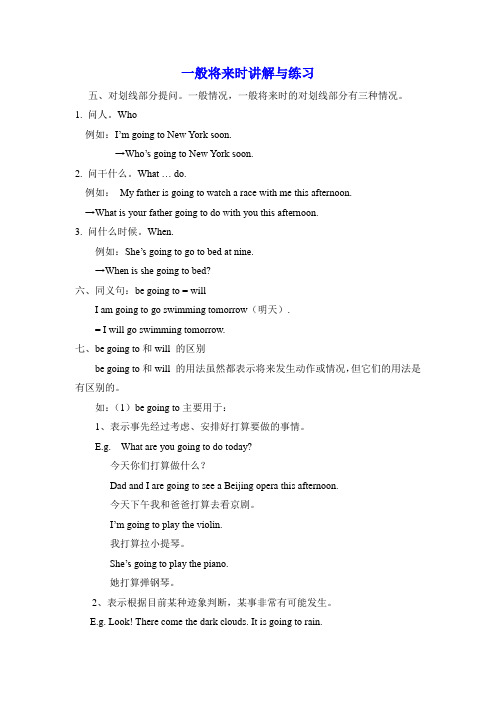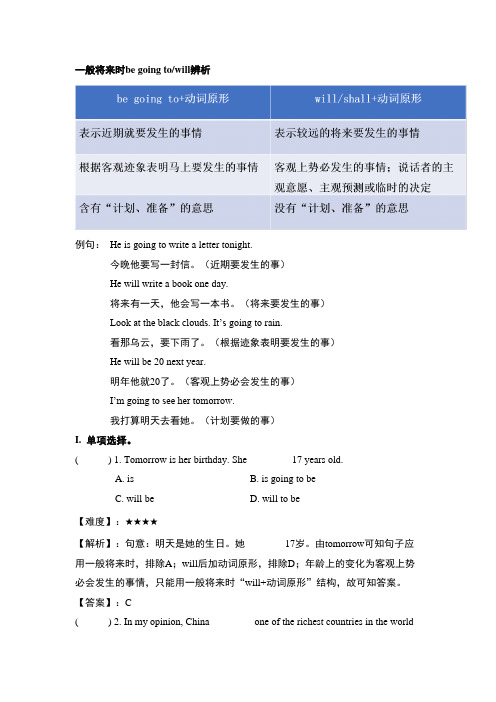初中英语语法——一般将来时讲解与练习(will与be going to区分)
一般将来时begoingto与will的解析和练习

练习4: 完形填空
The party (1) at 8 pm tomorrow. We (2) many things to prepare. First, we (3) some food and drinks. Then we (4) the furniture and (5) some music. We hope you can join us!
使用正确的动词和时间状语。
练习8: 用一般将来时回答问题
使用正确的动词形式描述将发生的事情。
一般将来时中的日常口语表达
常用短语
1. I am going to… (我打算… ) 2. She will probably… (她可能会… ) 3. He will most likely… (他很可能会… )
一般将来时 bgoingto 与 will 的解析和练习
一般将来时是英语中最常用的时态之一,它用来描述将要发生的事情或预测 未来。本文将讨论一般将来时的两种构成方式:be going to 和 will。我们将 解析它们的用法,区别,在多种情景中的应用,并提供丰富的练习来帮助你 熟练掌握这种时态。
一般将来时的概述
时间状语从句的使用方法
时间状语从句用于描述一种更具体的时间或日期,并且通常以连词“when”或 “while”开始。
其他表示未来的形式
除了一般将来时,还有许多其他描述未来的语法形式,如进行时将来时和完 成时将来时。
一般将来时中的动词时态
动词时态用于描述正在进行的动作,是否完成或是否在将来进行。未来进行时态,将来完成时态和现在 完成进行时态均用于将来某个时刻或动作的描述。
练习3: 改变句子的时态
练习1
改写下面的句子,用将来进行 时: "I will be studying English tomorrow."
中考英语:一般将来时(shall/will/be going to区别)

中考英语:一般将来时(shall/will/be going to区别)什么是一般将来时?一般将来时表示在将来某一时间将要发生的动作或存在的状态。
主语+ WILL+ 动词原形主语+ SHALL+ 动词原形主语+ AM/IS/ARE GOING TO + 动词原形SHALL的用法SHALL + 动词原形(主语一般都是第一人称)当主语是第一人称的时候,我们通常用SHALL来提问,多用于征求意见和建议。
SHALL I GO SHOPPING WITH YOU?SHALL WE GO SHOPPING?I SHALL HAVELUNCH.WILL 句型WILL + 动词原形肯定句:主语+ WILL + 动词原形否定句:主语+ WILL + NOT + 动词原形一般疑问句:WILL+主语+动词原形…?特殊疑问句:特殊疑问词+ WILL + 主语+ 动词原形…?BE GOING TO的句型BE GOING TO + 动词原形肯定句:主语+ BE GOING TO + 动词原形否定句:主语+ BE GOING TO + NOT + 动词原形一般疑问句:BE + 主语+ GOING TO+ 动词原形…?特殊疑问句:特殊疑问词+ BE + 主语+ GOING TO + 动词原形…?BE GOING TO & WILL的区别BE GOING TO一般指主观已经计划好的事情,强调某个意图是经过事先考虑好的,是近期计划,通常可以看到时间标志词。
表示客观迹象马上要发生的事情,有迹象预测。
WILL 指主语本身愿意做的事情,没有经过事先考虑,而是在说话的当时临时想到的,临时决定。
主观猜测或希望等内心活动,想得到肯定的回答、表示将会发生的事情。
1.—WHERE IS THE DIRTY CLOTHES?—I _WILL_ GET IT FOR YOU. (NOT PLANNING)2.—WHAT ARE YOU GOING TO DO THIS WEEKEND?—I AM GOING TO_ VISIT MY GRANDMA THIS WEEKEND. (PLANNED IT BEFORE)3. I HOPE SHE _WILL_ COME TO MY WEDDING.4. I THINK SHE _WILL_ LIKE MY PRESENT FOR HER.5. LOOK AT THE SKY,IT_IS GOING TO RAIN.一般将来时还有哪些标志词?•HE IS GOING TO TAKE A PHOTO TOMORROW.•HE IS GOING TO MAKE A CAKE NEXT WEEK.•HE IS GOING TO OPEN A CAN IN TWO DAYS.•HE THINKSHEWILL LOSE WEIGHT ONE DAY.TOMORROW类:TOMORROW, THE DAY AFTER TOMORROW 等NEXT +时间:NEXT WEEK, NEXT MONTH, NEXT YEAR 等IN + 时间段:IN TWO DAYS, IN A WEEK 等其他:IN THE FUTURE , ONE DAY, SOMEDAY,SOON 等一般将来时肯定句型•主语+ WILL/SHALL + 动词原形•主语+ AM/IS/ARE GOING TO + 动词原形一般将来时否定句型•主语+ WILL/SHALL + NOT + 动词原形•主语+ AM/IS/ARE + NOT + GOING TO + 动词原形一般将来时一般疑问句型•WILL/SHALL + 主语+ 动词原形…?•AM/IS/ARE + 主语+ GOING TO + 动词原形…?一般将来时特殊疑问句型•疑问词+ WILL/SHALL/BE GOING TO + 主语+ 动词原形…?。
(完整版)语法一般将来时begoingto讲解与练习

Grammar语法:simple future tense‘going to’一般将来时be going to 是一种固定结构,它后面要接动词原形往往有表示将来的时间状语,如:tomorrow, next week等。
(1) 表示主语的意图,即主语计划或打算要做的事。
We are going to have a class meeting this afternoon.(2) 表示主语根据目前迹象所作出的推测。
Look at the black clouds. It's going to rain.(推测)I”m not feeling well, I”m going to be ill. 表示说话人的感觉而已肯定句结构:主语+be(am / is / are) + going to +动词原形+其它。
I am going to buy something tomorrow morning.She is going to see Mr. Wang this afternoon.They are going to visit the factory next week.否定句结构:主语+be(am / is / are)+not + going to +动词原形+其它。
They are not going to visit the factory next week.疑问句结构:be(am / is / are)+主语+ going to +动词原形+其它?肯定回答:Yes, 主语+ am/is/are.否定回答:No, 主语+ isn't/aren't. / No, I'm not.不过I am... 在改为一般疑问句时常常改为“Are you ....?”。
—Are they going to visit the factory next week?—Yes, they are. (No, they aren't.) (一般疑问句及其回答)be going to 的特殊用法(1)There be 句型的be going to 结构为:There is / are going to be...(注意句型中going to 后面的be不能改为have。
begoingto和will判断方法

begoingto和will判断方法begoingto和will是英语中表示将来的两种常用形式。
本文将以begoingto和will为切入点,探讨它们的用法和区别。
一、begoingto的用法begoingto表示按照计划或者根据现有证据将要发生的动作或事件。
它通常用于以下几种情况:1.根据现有迹象或证据预测未来:例如,天空阴沉,我们可以说"It's going to rain."(要下雨了)2.表达打算、计划或决心:例如,"I am going to study abroad next year."(我明年要去留学)3.预测或推测未来:例如,"She is going to be a famous singer someday."(她将来会成为一名著名歌手)二、will的用法will是表示将来的一种常用形式,它用于以下几种情况:1.表示意愿、决心或承诺:例如,"I will help you with your homework."(我会帮你做作业)2.表示即时决定:例如,"The phone is ringing, I will answer it."(电话响了,我来接)3.表示预测、推测或假设:例如,"I think it will be a sunny day tomorrow."(我认为明天会是个晴天)三、begoingto和will的区别1.时间表达:begoingto通常用于已经计划好的未来事件,而will 则更多用于即时决定或意愿表达。
2.预测的依据:begoingto通常基于现有迹象或证据进行预测,而will更多是主观的预测或推测。
3.语气:begoingto更加肯定和确定,而will则更加含糊和不确定。
举例来说:1.根据天空阴沉的迹象,我们可以说"It's going to rain."(要下雨了)这是根据现有迹象的预测。
一般将来时be going to与will的区别

一般将来时be going to与will的区别be going to与will两者都可表示将要发生的事、将要去做某事,但它们有如下几点区别:1. be going to表示近期、眼下就要发生的事情,will表示的将来时间则较远一些,如:He is going to write a letter tonight.He will write a book one day.2. be going to表示根据主观判断将来肯定发生的事情,will表示客观上将来势必发生的事情。
He is seriously ill. He is going to die.He will be twenty years old.这里的be实际上也是省略了to的不定式to be(将是)。
这里的will是助动词,本身无意义,只起语法作用。
3. be going to含有“计划,准备”的意思,而will则没有这个意思,如:She is going to lend us her book.He will be here in half an hour.4.在有条件从句的主句中,一般不用be going to,而多用will,如:If any beasts comes at you, I'll stay with you and help you.这里的will是情态动词,stay是to stay省略了to。
练习题1.It's Saturday tomorrow.Parents____________(have)a birthday party for Maria.2.Look at the clouds.it _______________(rain)3.there _______________(be)a sports meeting next month.4.I ______________________(send)an e-mail to my friend this evening在每个括号前面填空A:Will you be coming in to work this wekkend?B:I think so. I have so much work to do! But ask me about next week.A:OK. you ____________(work)next week?B:I am going to go on vacation for a week.Next week._____________(not/work)A: you________________ (sleep)late every morning?B:Of cause.I ____________(sleep)late every morning.I___________ (not get)up early when iamonvacation!I_________(have)somuchfunthattimewillflyand,beforeIknowit,myvaca tion willbe over and I ___________________(get)up early again and work every day.选择正确的答案1、He ________ very busy this week, he ________ free next week.A. will be; isB. is; isC. will be; will beD. is; will be ( )2、. There ________ a dolphin show in the zoo tomorrow evening.A. wasB. is going to haveC. will haveD. is going to be ( )3、–________ you ________ free tomorrow?–No. I ________ free the day aftertomorrow.A. Are; going to; willB. Are; going to be; willC. Are; going to; will beD. Are; going to be;will be ( )4、Shall I buy a cup of tea for you?–________.(不,不要。
初二英语一般将来时讲解及练习

初二英语一般将来时讲解及练习讲解一般将来时表示将来某个时间或某个动作或状态一定会发生或存在的情况。
在英语中,一般将来时的构成主要有两种形式:will/shall + 动词原形和be going to + 动词原形。
will/shall + 动词原形will/shall + 动词原形是一般将来时的最基本形式。
其中,will通常用于第一人称,shall通常用于第二和第三人称。
例如:I will go to the party tomorrow.(我明天去参加聚会。
)He will finish his homework after dinner.(他晚饭后完成他的作业。
)They will have a picnic in the park next weekend.(他们下周末在公园野餐。
)be going to + 动词原形be going to + 动词原形表示将要发生或存在的事情,通常用于未来的计划、意图或打算。
例如:I am going to study abroad next year.(我明年要去留学。
)She is going to visit her grandparents this weekend.(她这个周末要去看她的祖父母。
)We are going to have a meeting next week.(我们下周要开会。
)注意:在使用be going to + 动词原形时,要注意主语和be动词之间的一致性。
例如:He is going to play football.(他将要去踢足球。
)而不能说:He are going to play football.练习题一、用一般将来时填空I (visit) my grandparents next weekend.They (have) a party next Saturday.He (be) a doctor when he grows up.We (travel) to Europe next summer.She (write) a novel someday.They (move) to a new house next month.I (study) hard so I can get into a good college. He (play) the piano at the concert next week. We (have) a meeting tomorrow morning. She (graduate) from high school in two years.二、将下列句子变为一般将来时I study English every day. _She teaches math at the high school.They are going to the movies tonight.He likes to read books in his free time. ___ We have dinner at six o'clock every evening. _ The train arrives at 8:00 in the morning. __ She sings in the choir on Sundays.They play soccer after school. ___He works at a restaurant on weekends. ____ We visit our grandparents once a month. __ 三、用一般将来时完成下列对话A: What are you going to do this weekend? B: I'm going to visit my grandparents.A: That sounds nice. Where do they live?B: They live in the countryside.A: What are you going to do there?B: We're going to have a picnic and go fishing.A: That sounds like fun. Are you going with your parents?B: Yes, my parents and my younger brother are coming too.A: Have a great time!B: Thank you, we will!四、阅读理解My Future PlansMy name is Jack and I'm a sophomore in high school. I have a lot of plans for my future. First of all, I want to go to a good college and study business. I have always been interested in business and I think I would be good at it. After graduation, I plan to start my own business.I want to own a restaurant that serves healthy and delicious food.In order to achieve my goals, I need to work hard in school and get good grades. I also need to learn about managing money and running a business. I have been studying these topics on my own and I plan to take some courses in college.I know it won't be easy, but I'm determined to succeed. I believe that if I work hard and stay focused, I can achieve anything I want.What does Jack want to study in college?What does Jack plan to do after graduation?What kind of restaurant does Jack want to own?What does Jack need to do in order to achieve his goals?What does Jack believe?答案:Jack wants to study business in college.Jack plans to start his own business after graduation.Jack wants to own a restaurant that serves healthy and delicious food.Jack needs to work hard in school, get good grades, learn about managing money and running a business, and take courses in college.Jack believes that if he works hard and stays focused, he can achieve anything he wants.。
一般将来时讲解(附习题+答案)

一般将来时讲解(附习题+答案)一、一般将来时的含义:表示动作发生在将来二、一般将来时的句型:(1) will/shall+动词原形(2) be going to+动词原形三、一般将来时的时间状语:tomorrow(明天)、the day after tomorrow(后天)、next...(下一...): next week(下一周)、next year(明年)、next month(下个月)in+一段时间(...之后): in three days(三天之后)、in the future在未来this evening(今天晚上)四、一般将来时的句型结构:(1) will/shall+动词原形(will not =won’t)(will 各种人称均可用,shall 只能用于第一人称)1)肯定句:主语+will/shall+动词原型...如:I will go to school tomorrow.我明天将会去学校He will go to school tomorrow.他明天将会去学校。
2)否定句:主语+will/shall+not+动词原型...如:I won’t go to school tomorrow.我明天将不会去学校。
He won’t go to school tomorrow.他明天将不会去学校。
3)一般疑问句:Will/Shall +主语+动词原型...如:Will you go to school tomorrow?你明天要去学校吗?Will he go to school tomorrow?他明天要去学校吗?肯定回答:Yes, 主语+will.如:Yes, I will.Yes, he will.否定回答:No,主语+will+not.如:No, I won’t.No, he won’t.4) 特殊疑问句:特殊疑问词+will/shall+主语+动词原型...如:What will you do tomorrow?你明天将会做什么?What will he do tomorrow?他明天将会做什么?(2) be going to+动词原形1)肯定句:主语+be going to +动词原型...如:I am going to buy some books tomorrow.我明天打算去买一些书。
(完整版)英语将来时态讲解、练习、答案

将来时表示法一般将来时表示在将来某个时间要发生的动作或存在的状态。
表示“将来”的句式很多,常用的句式及用法归纳如下:一、be going to+动词原形(专题与will的区别)1.这种结构表示主体现在打算在最近或将来要做某事。
这种打算往往是事先考虑好的。
如:My brother is going to learn English next year. 我哥哥准备明年学英语。
I am going to meet Tom at the station at six. 我六点钟要到火车站去接汤姆。
2.这种结构还可以表示说话人根据已有的迹象认为非常可能即将发生某事。
如:Look at these black clouds——it is going to rain. 看这些乌云——要下雨了。
I’m afraid I’m going to have a bad cold. 恐怕我要得重感冒了。
注意:1. 如果be going to后接的是形容词或副词(there)时,其后应加上be,然后再接形容词或副词。
如:I’m going to be busy this Sunday. 这个星期天我很忙2. there be句型也可用于这种句型中,但there不能和have连用。
如:There is going to be an English film this evening. 今天晚上有一场英文电影。
二、shall/ will+动词原形。
在书面语中,第一人称常用shall, 但在口语中,所有人称都可用will.1.will/ shall均可表示单纯的将来。
如:The radio says it will be cloudy tomorrow. 收音机报道明天多云。
2.表示预料中将要发生的动作或情况。
如:You’ll feel better after having this medicine.吃了这药,你就会感到好些的。
初中英语语法——一般将来时讲解与练习(will与be going to区分)

HEART LINE:
Marked line: Lucky in love! Happy relationships.
Weak line: Unlucky in love/ Unloyalty
THE HEAD LINE
Curve – Marked line: Brilliant memory/ creativity/ Unrealistic Straigth- Weak line: Bad Memory/ Poor concentration/ Realistic
1) Why are you working so hard these days? (buy)
- Because I’m going to buy a car , so I’m saving as much as I can
2) What are you going to buy Jill for her birthday? (buy) - A CD. -Mmm, but she hasn’t got a CD player. - In that case, I will buy her a book.
THE LIFE LINE
Large and marked line: Good health / Energy /Power Weak line: A lot of illness/ weak personality…
The Anabella’s Future
Anabella is a princess. She wants to know what will happen to her in the future, so she goes to
BE GOING TO AND
一般将来时be_going_to_与will的解析和练习知识讲解

否定句式:
There isn’t going to be a sports meeting at our school next week.
四、使用be going to 应注意的两点 1. there be句型中going to 后面的be不能改为have 例如:
特殊疑问句结构:
特殊疑问词+will +主语+动词原形+其他?
四、there be句型的一般将来时 1. There is/are going to be
如:There is going to be a sports meeting at our school next week.
一般疑问式:
Is there going to be a sports meeting at our school next week?
3. __Is__ Tom _g_o_i_n_g__to__p_la_y_ (play) football with us tomorrow?
4.There _a_r_e_g_o_i_n_g_t_o__b_e_ (be) strong winds tonight.
5.He _is__g_o_in_g__to__b_e_ (be)back in three hours.
2. There will be
(2).变一般疑问句 把will 提到句首,原句照抄结尾变问号。
They will have an English party next week. Will they have an English party next week?
Yes, they will. / No, they won’t.
2024年中考英语一般将来时详解以及练习

中考英语一般将来时详解以及练习一、基本结构和概念一般将来时主要用于表示将来某个时间会发生的动作或状态,其基本结构是“will/shall + 动词原形”或“be going to + 动词原形”。
其中,“will”用于所有人称,表示主观判断、意愿、承诺等;“shall”主要用于第一人称(I和we),但在现代英语中,“shall”的使用已经逐渐减少,很多时候被“will”所替代。
而“be going to”则用于表示根据现有迹象判断将要发生的动作或计划、打算做某事。
例如:I will go to the park tomorrow.(我明天会去公园。
)We shall have a lot of rain next month.(下个月将下很多雨。
)They are going to travel to Europe next year.(他们打算明年去欧洲旅行。
)二、与时间状语连用一般将来时经常与时间状语连用,以明确动作或事件发生的时间。
常见的时间状语包括tomorrow(明天)、next week/month/year(下周/下月/明年)、in the future(将来)等。
例如:I will finish my homework tomorrow.(我明天会完成我的作业。
)They are going to buy a new car next month.(他们下个月打算买一辆新车。
)三、表示打算、预测或推断除了表示单纯的将来事实外,一般将来时还可以用于表达打算、预测或推断。
这种用法常常与“will probably/maybe”等情态动词连用,以增加表达的准确性或不确定性。
例如:She will probably pass the exam.(她可能会通过考试。
)It will rain tomorrow, so we may stay at home.(明天会下雨,所以我们可能会待在家里。
一般将来时be-going-to-与will的解析和练习

afternoon. 今天下午我们打算开班会。(安排)
Look at the black clouds. It's going to rain. 看那些乌云,快要下雨了。(推测)
二、be going to 在肯定句中的形式
you ....?” 例如: They are going to see the car factory next week. (肯定句) They are not going to see the car factory next week. (否 定句)
—Are they going to see the car factory next week? —Yes, they are. (No, they aren't.) (一般疑问句及其回答)
2.They _a_r_e_g_o_i_n_g__to__fi_n_i_sh__ (finish) the work this afternoon.
3. __Is__ Tom _g_o_i_n_g__to__p_la_y_ (play) football with us tomorrow?
4.There _a_r_e_g_o_i_n_g_t_o__b_e_ (be) strong winds tonight.
特殊疑问句结构:
特殊疑问词+will +主语+动词原形+其他?
2. There will be
如:There will be a sports meeting at our school next week. 一般疑问式: Will there be a sports meeting at our school next week? 回答:
一般将来时讲解与练习(含答案)

一般将来时讲解与练习五、对划线部分提问。
一般情况,一般将来时的对划线部分有三种情况。
1. 问人。
Who例如:I’m going to New York soon.→Who’s going to New York soon.2. 问干什么。
What … do.例如:My father is going to watch a race with me this afternoon.→What is your father going to do with you this aftern oon.3. 问什么时候。
When.例如:She’s going to go to bed at nine.→When is she going to bed?六、同义句:be going to = willI am going to go swimming tomorrow(明天).= I will go swimming tomorrow.七、be going to和will 的区别be going to和will 的用法虽然都表示将来发生动作或情况,但它们的用法是有区别的。
如:(1)be going to主要用于:1、表示事先经过考虑、安排好打算要做的事情。
E.g. What are you going to do today?今天你们打算做什么?Dad and I are going to see a Beijing opera this afternoon.今天下午我和爸爸打算去看京剧。
I’m going to play the violin.我打算拉小提琴。
Sh e’s going to play the piano.她打算弹钢琴。
2、表示根据目前某种迹象判断,某事非常有可能发生。
E.g. Look! There come the dark clouds. It is going to rain.瞧!乌云密集,天要下雨。
一般将来时will和be going to辨析

一般将来时be going to/will辨析例句:He is going to write a letter tonight.今晚他要写一封信。
(近期要发生的事)He will write a book one day.将来有一天,他会写一本书。
(将来要发生的事)Look at the black clouds. It’s going to rain.看那乌云,要下雨了。
(根据迹象表明要发生的事)He will be 20 next year.明年他就20了。
(客观上势必会发生的事)I’m going to see her tomorrow.我打算明天去看她。
(计划要做的事)I. 单项选择。
( ) 1. Tomorrow is her birthday. She ________ 17 years old.A. isB. is going to beC. will beD. will to be【难度】:★★★★【解析】:句意:明天是她的生日。
她________17岁。
由tomorrow可知句子应用一般将来时,排除A;will后加动词原形,排除D;年龄上的变化为客观上势必会发生的事情,只能用一般将来时“will+动词原形”结构,故可知答案。
【答案】:C( ) 2. In my opinion, China ________ one of the richest countries in the worldone day.A. is going to becomeB. are going to becomeC. will becomeD. becomes【难度】:★★★★★【解析】:one day (将来的)有一天,为一般将来时的时间标志词,句子应用一般将来时,排除D;China作主语,谓语动词用单数,排除B;由in my opinion 在我看来,可知本句为主观预测,只能用一般将来时“will+动词原形”结构,故可知答案。
一般将来时be-going-to-与will解析和练习备课讲稿-2023年学习资料

四、there be句型的一般将来时-1.There is/are going to be-知:There is going to be a sports meeting at-our school next we k,-一般疑问式:-Is there going to be a sports meeting at-ou school next week?-回答:-Yes,there is./No,there isn't-否 句式:-There isn't going to be a sports meeting at-our s hool next week.
四、使用be going to应注意的两点-1.there be句型中going to后面的be不能改为ave-例如:-There is going to be a football match next-Sa urday in our school.-下周六我们学校将有一场足球比赛。e,go,leave arrive等表示位置移动的动-词常用现在进行时表示将要发生的动作,它-们很少与be going to结构 用。例如:-Miss Sun is coming tonight.-今晚孙小姐要来。
殷将来时的构成:-1.be going to+动词原-形-2.助动词W山+动词原形-动词原形包指动词be和 为动词原形
一、be going to的用法点拨-be going to是一种固定结构,后面接动词原-形,用来表示按计 或安排要发生的动作,-有时也可以表示推测将要或肯定会发生的-动作,有“准备;打算”的意思。含有be-goi g to结构的句子中往往有表示将来的时-间状语。例如:-We are going to have a cl ss meeting this-afternoon.-今天下午我们打算开班会。-Look at the b ack clouds.It's going to rain.-看那些乌云,快要下雨了。(推测
be going to 结构以及与will区别以及练习

2017。
11.26“be going to” 结构一、“be going to"表示将要发生的事或打算、计划、安排要做的事.它是一般将来时的一种表达形式,其后常有表示将来的时间状语.如:tomorrow,next week等。
例如:We are going to play football tomorrow.明天我们将去踢足球。
二、构成:be going to +动词原形.在be going to 结构中,be随主语人称和数的变化而变化,而going to 固定不变.例如:He is going to clean the classroom tomorrow。
They are going to clean the classroom tomorrow.三、句式变化:be going to 结构的句式变化都可在be上完成。
变疑问句时,将be提至主语之前;变否定句在be后加not。
例如:They are not going to have a picnic next week.下星期他们将不去野餐.Are they going to have a picnic next week?下星期他们将去野餐吗?What are they going to do next week?下星期他们打算干什么?四、“be going to +动词原形”的用法。
1。
表示主语打算、安排在最近或将来要做某事或出现的某种状态。
这种主观意图,一般已做过事先安排,故其实现的可能性较大,其主语常是人。
例如:We are going to swim next Sunday。
下星期天我们打算去游泳。
(已打算好下星期天去游泳)2。
表示根据现有情况、某种迹象,判断将要或即将发生的动作。
此时不含有主观意图,只是表示说话人对客观事态发展的判断或推测,此时主语可以是人,也可以是物。
例如:Look! It’s going to rain. 看!天要下雨了.(可能根据天气闷热、雷声隆隆等迹象判断天要下雨)I'm not feeling well, I’m going to be ill。
英语语法:一般将来时willshalldobegoingtodo区别一目了然

英语语法:一般将来时willshalldobegoingtodo区别一目了
然
will/shall do和be going to do,都可以用来表示一般将来时,它们的区别到底在哪里呢?
首先,我们来看几个例句。
1.Next month we will have our school open day.
下个月我们将迎来学校开放日。
(客观上势必发生的事情)
2.Now that you can't agree with him, I will tell him to find others to help him tomorrow.
既然你不能同意他的观点,那我明天让他去找别人帮忙。
(临时做出的打算)
3.To help the poor ,we are going to set up a temporary clinic there.
为了帮助穷人,我们打算在那里设立一个临时诊所。
(表示主观打算)
4.Look at the dark clouds. It is going to rain.
看那乌云,要下雨了。
(根据乌云迹象表示要下雨了)
根据上面4个例句,我们不难看出:
1.will/shall+do 表示客观上势必发生的事情或临时做出的打算,常与next week,tomorrow,before long,in the future,later on,the day after tomorrow等时间状语连用。
2.be going to+do 表示主观计划、打算做某事或者根据迹象表明
某事即将发生。
相信积累的力量。
初中英语willshall”与“begoingto”两者的区别及练习

初中英语willshall”与“begoingto”两者的区别及练习初中英语will / shall”与“be going to”两者的区别will / shall+v.”与“be going to+v.”。
两者均可表示将来时间和意图,两者有时可换用,有时不可换用。
不可换用的情况主要是:若强调某个意图是经过事先考虑好的,用be going to;若表示某个意图没有经过事先考虑,而是在说话的当时才临时想到的,则用will。
比较:“Mary is in hospital.” “Oh, really? I didn’t know. I’ll go and visit h er.” “玛丽住院了。
”“啊,真的吗?我还不知道。
我要去看看她。
” (临时想法,不能用be going to)“Mary is in hospital.” “Yes, I know. I’m going to visit her tomorrow.” “玛丽住院了。
”“我知道,我打算明天去看看她。
” (事先考虑的意图,不能用will) 另外,若指迹象表明要发生某事,用be going to 而不用will。
如:Look at those black clouds. It’s going to r ain. 看那些乌云,要下雨了。
一、单项选择。
( ) 1. There __________ a meeting tomorrow afternoon.A. will be going toB. will going to beC. is going to beD. will go to be( ) 2. Charlie ________ here next month.A. isn’t workingB. doesn’t workingC. isn’t going to workingD. won’t work( ) 3. He ________ very busy this week, he ________ free next week.A. will be; isB. is; isC. will be; will beD. is; will be( ) 4. There ________ a dolphin show in the zoo tomorrow evening.A. wasB. is going to haveC. will haveD. is going to be( ) 5. –________ you ________ free tomorrow?– No. I ________ free the day after tomorrow.A. Are; going to; willB. Are; going to be; willC. Are; going to; will beD. Are; going to be; will be( ) 6. Mother ________ me a nice present on my next birthday.A. will givesB. will giveC. givesD. give( ) 7. – Shall I buy a cup of tea for you?–________. (不,不要。
- 1、下载文档前请自行甄别文档内容的完整性,平台不提供额外的编辑、内容补充、找答案等附加服务。
- 2、"仅部分预览"的文档,不可在线预览部分如存在完整性等问题,可反馈申请退款(可完整预览的文档不适用该条件!)。
- 3、如文档侵犯您的权益,请联系客服反馈,我们会尽快为您处理(人工客服工作时间:9:00-18:30)。
Large and marked line: Good health / Energy /Power Weak line: A lot of illness/ weak personality…
The Anabella’s Future
Anabella is a princess. She wants to know what will happen to her in the future, so she goes to
1) She ____ to the stadium. (not/to walk) 2) __you____ to London? (to fly)
3) John____ anything. (not/to eat)
4) ____she____ at a campsite? (to stay)
5) What___ you____ tomorrow? (to do)
HEART LINE:
Marked line: Lucky in love! Happy relationships.
Weak line: Unlucky in love/ Unloyalty
THE HEAD LINE
Curve – Marked line: Brilliant memory/ creativity/ Unrealistic Straigth- Weak line: Bad Memory/ Poor concentration/ Realistic
–
Negative:
–
Question:
Exercise 4.
Put the verbs in brackets into the gaps. Use the going to-future. Watch the punctuation and form sentences or questions. Example: ___ they __________ a football for Peter? (to buy) Answer: Are they going to buy a football for Peter?
3) Dad, can you do this for me? - I’m sorry. Ask Mum. She will do it for you.
4) Why have you got so many eggs? -Because I am going to make an omelette. 5) I haven’t got enough money to get home. - I will lend you some, if you like. How much do you need?
•
she / watch / the match
–
Positive:
–
Negative:
–
Question:
•
they / wait / in the park
–
Positive:
–
Negative:
–
Question:
•
He / buy / bread / this afternoon
–
Positive:
6) I _____Dennis tonight. (not/to see)
7) __Alexander_____ the next bus? (to take)
8) They_______ football in the gym. (not/to play)
9) When ___ you_______ me the book back? (to give)
visit a fortune teller.
D:Can you see my future?
FT: I certainly can.
D: Tell me about it!
FT: You will marry a rich prince.
D: Auch! Can you see him?
Is he handsome?
FT: Well … Not when you first meet him…He looks like a frog!
P: A frog?
F: Yes…Some day you will meet a frog! And you will kiss it.
P: I will not!
F: Yes, you will and it will turn to a handsome prince! FT: What are you doing?
P: I’m not going to listen to any morece!
FT: You can’t change the future my dear…
(When Anabella returns to the palace…)
FT: Oh!! My dear, you will have to kiss a lot of frogs
PREDICTIONS WITH PRESENT EVIDENCE
WILL
I left the door open. I will close it right now.
(In the restaurant) W :What would you like to drink?
I will have a cup of coffee, please.
before to find the right one.
Exercise 2.
• Put the verbs into the correct form (future I). Use going to.
• It (rain) . • They (eat) stew. • I (wear) blue shoes tonight. • We (not / help) you. • Jack (not / walk) home. • (cook / you) dinner? • Sue (share / not) her biscuits. • (leave / they) the house? • (take part / she) in the contest? • I (not / spend) my holiday abroad this year.
IS GOING TO HAPPEN: The situation now make us believe that.
Look at those black clouds! It’s going to rain.
She is pregnant. She is going to have a baby.
BE GOING TO AND
WILL FUTURE
I AM GOING TO : I HAVE DECIDED TO DO STH.
Today, I am going to drive my new motorcycle, then I am going to phone my best friend and finally I am going to read my favourite novel.
Personal opinion
Don’t worry. I will help you with your homework.
I will love you forever.
You will be rich
Offers Promises Predictions
Exercise 1.- Choose the correct form of the verb.
10) Angela_______________ a week in Japan. (to spend)
1) Why are you working so hard these days? (buy)
- Because I’m going to buy a car , so I’m saving as much as I can
2) What are you going to buy Jill for her birthday? (buy) - A CD. -Mmm, but she hasn’t got a CD player. - In that case, I will buy her a book.
•
you / learn / Irish
–
Positive:
–
Negative:
–
Question:
•
she / buy / a computer
–
Positive:
–
Negative:
–
Question:
•
we / take / the bus
–
Positive:
–
Negative:
–
Question:
Did you call Sue? No, I forgot it.
I will call her tonight
Decisions at the time of speaking
I am little hungry. I think I will have a sandwich. I don’t think I will go out tonight. I am too tired.
Exercise 3.
•
Write sentences in going to future.
•
he / get up / early
–
Positive:
–
Negative:
